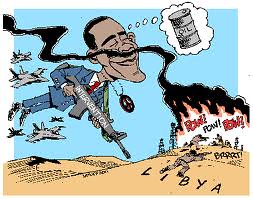
The U.S. imperialists attacked the North African state of Libya in order to seize the oil-rich country and establish a military beachhead inside the region. Thousands have died in the imperialist war., a photo by Pan-African News Wire File Photos on Flickr.
Has Obama let Africa down?
Saturday, 03 November 2012 20:19
Four years ago Africa greeted Barack Obama's election with rapture, predicting America's first black president would smother the continent with attention. But instead of warm hand-holding, Africa got hard-headed, security-first policies.
Africa's response to Obama's election in November 2008 was nothing short of ecstatic. A Nigerian foreign minister wept, Nelson Mandela hailed it as proof that people should “dare to dream”, and Kenya declared a national holiday.
The fawning was quickly reciprocated, with Obama visiting Ghana just five months after his inauguration.
“I have the blood of Africa within me,” he emotively told the Ghanaian parliament and rapt television viewers across the continent. Africa, the new president declared, was now “a fundamental part of our interconnected world.”
But as America's Great Recession deepened, wars in Iraq and Afghanistan trundled on and the Arab Spring exploded, sub-Saharan Africa found itself in a familiar spot; on the back-burner.
“There was an expectation that he was going to be the US President for Africa,” said long-time South African diplomat Thomas Wheeler, now of the South African Institute of International Affairs.
“It was just an unrealistic expectation.”
“The fact that he had an African father did not mean that he was going to devote a lot more time to Africa.”
Symbolically, Obama's visit to Ghana was to be his only trip to the continent. Equally symbolically, it took until June this year for his White House to come up with a nine-page “US strategy toward sub-Saharan Africa”. Since Obama took office it has been widely reported that the administration has expanded a network of air bases across Africa, training its might on Al-Qaeda affiliated militants and other groups.
Clandestine bases in Burkina Faso, Mauritania and Uganda are said to have been used variously to spy on Al-Qaeda in the Islamic Maghreb and track elements of the Lord's Resistance Army, led by Joseph Kony.
Unconfirmed US drone strikes are reported with some frequency in Somalia.
According to the London-based Bureau of Investigative Journalism, between 58 and 170 people have been killed in 10 to 23 strikes on Somalia. The linchpin for this newly securitised policy toward Africa is the United States Africa Command, or Africom, which operates as a nerve centre for US military operations and boasts a 2 000-strong staff. — AFP
No comments:
Post a Comment